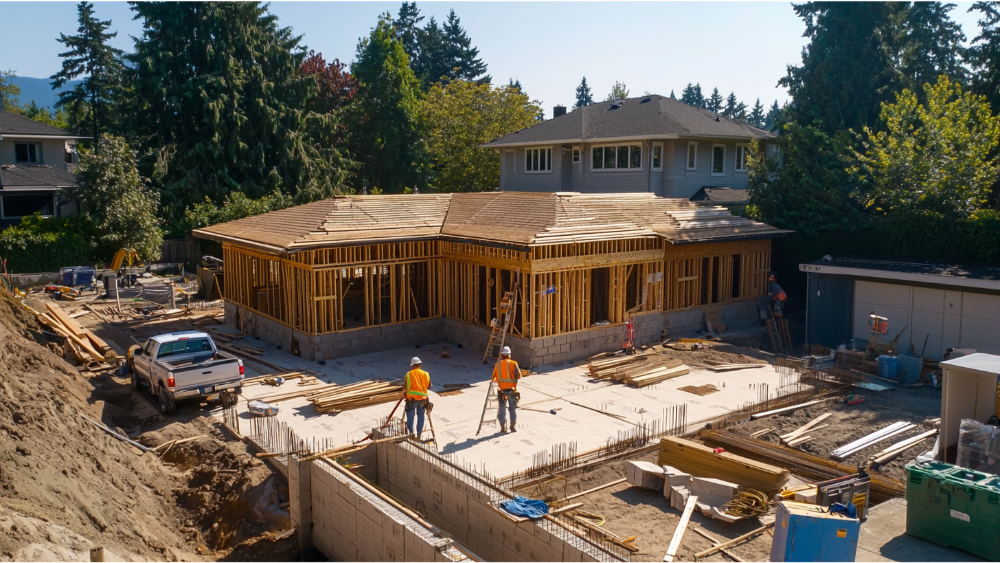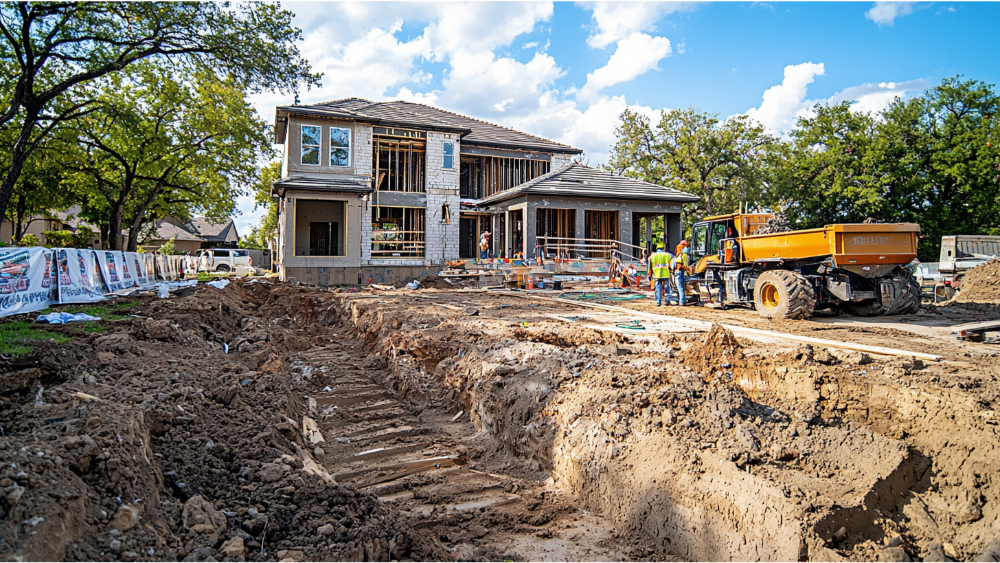
General Contractor vs Builder: What are the Differences?
Building a home from scratch is a complex process that requires the expertise of professionals in different fields. Two key roles in this home-building process are general contractors and builders. Both oversee the construction of a building, but their responsibilities and scope of work vary significantly.
In this article, we will explore the difference between a builder and a general contractor to give you a better understanding of their roles in the construction industry.
General Contractor

A general contractor is responsible for managing and overseeing all aspects of an entire construction project. They act as the main point of contact for the client and coordinate with architects, engineers, subcontractors, suppliers, and other involved parties on and off the construction site.
The primary duties of a general contractor include:
- Creating project plans and schedules
- Hiring and managing subcontractors
- Procuring building materials and equipment
- Ensuring compliance with building codes and regulations
- Managing the project budget and finances
- Overseeing quality control and safety measures
Pros vs Cons of Hiring a General Contractor
Pros:
- Experienced in managing complex construction projects
- Have established relationships with subcontractors and suppliers
- Can provide valuable advice and insights during the building process
Cons:
- Can be more expensive compared to hiring a builder directly
- May not have as much hands-on experience in actual construction work
Builder

On the other hand, a custom home builder specializes in bringing architectural plans to life, following specifications from architects and engineers.
The main responsibilities of a builder include:
- Reading blueprints and executing construction plans accordingly
- Coordinating with subcontractors to ensure timely completion of tasks
- Overseeing the installation of plumbing, electrical, heating/cooling systems, etc.
- Supervising laborers and other construction workers
- Ensuring safety protocols are followed on-site
- Compliance with local building codes
Pros vs Cons of Hiring a General Contractor
Pros:
- Typically have more hands-on experience in actual construction work
- May be more cost-effective compared to hiring a general contractor
Cons:
- May not have as much experience managing complex projects
- Limited expertise in areas outside of physical construction work
The Key Differences Between a General Contractor and a Builder

While general contractors and custom home builders both play essential roles in the construction process, their responsibilities and expertise differ significantly. Here are some key differences between the two:
Project Management
General contractors are responsible for overseeing the entirety of a construction project, from its inception to completion. This includes creating detailed project timelines, managing budgets, and coordinating between multiple stakeholders such as architects, engineers, and subcontractors. Their experience in handling complex logistics allows them to plan and execute projects efficiently, ensuring that deadlines are met and resources are allocated properly.
On the other hand, a builder’s project management duties are typically more focused on the actual construction work itself. Builders work directly on-site, supervising laborers and ensuring that the construction progresses according to the blueprints and specifications. While they may coordinate with subcontractors for specific tasks, their primary focus is on executing the technical aspects of the build rather than managing the overarching elements of the project. This distinction highlights the general contractor’s role as a facilitator of the entire process, while the builder concentrates on turning plans into physical structures.
Licensing Requirements
General contractors typically require a more comprehensive license to oversee entire construction projects. This licensing process often involves meeting specific education and experience requirements, passing exams, and maintaining insurance and bonding. The license ensures they are well-versed in project management, building codes, safety standards, and contracting laws, making them qualified to oversee large-scale or complex constructions.
On the other hand, builders may operate under narrower licensing requirements that focus more on the technical and hands-on aspects of construction. Depending on the jurisdiction, some builders might not require a license at all for smaller or less complex projects, while others may need trade-specific certifications or licenses, such as those for plumbing or electrical work. This difference highlights the broader responsibilities tied to a general contractor’s role when compared to the more specialized, hands-on nature of a builder’s work. It's essential to research local regulations to understand the licensing requirements for both roles in your area.
Level of Responsibility
General contractors carry a higher level of responsibility as they are accountable for the entire scope of a construction project. This includes financial management, project timelines, hiring and supervising subcontractors, and ensuring compliance with building codes and legal regulations. Because of their extensive role, they must oversee every aspect of the project, handling potential issues that arise and ensuring the project meets the client's expectations from start to finish.
Builders, in contrast, generally have a narrower scope of responsibility that focuses on the hands-on construction process. They are directly involved in the day-to-day activities on-site, such as interpreting blueprints, managing labor, and ensuring the craftsmanship aligns with the project’s specifications. While they ensure quality and safety in their domain, they typically do not handle broader managerial tasks like budgeting or coordinating the work of architects and subcontractors. This distinction illustrates how a general contractor assumes a more administrative and logistical leadership role, whereas a builder takes a more technical and execution-focused approach.
Which One Do You Need?
Whether you need a general contractor or a builder depends on the specific requirements of your construction project. For smaller projects, such as home renovations or additions, hiring a builder may be sufficient.
However, for larger and more complex projects like new home construction or commercial buildings, it is advisable to hire a general contractor who can oversee and manage all aspects of the entire construction process. Carefully consider your options before making a decision. It's also recommended to consult with professionals in the industry for their expertise and recommendations.
It's essential to research and carefully consider your options before making a decision. It's also recommended to consult with professionals in the industry for their expertise and recommendations.
Skyline Build & Design
Your Partner in Exceptional Home Building Skyline Build & Design
At Skyline Build & Design, we pride ourselves on being the premier choice for your home building needs. As a reputable company with years of experience, we understand the significance of your home and the importance of creating a space that reflects your vision and lifestyle. Our team of skilled professionals, including both general contractors and builders, is dedicated to delivering exceptional craftsmanship and unparalleled attention to detail.
Whether you are embarking on a new construction project or considering a renovation, Skyline Build & Design is here to exceed your expectations. Experience the difference between working with a trusted team that prioritizes your vision, and delivering exceptional results that will stand the test of time.
Contact us today to discuss your home building needs and let us turn your dream home into a reality.
Frequently Asked General Contractor VS Builder Questions

Can I hire a general contractor for a small project like a bathroom remodel?
Yes, you can hire a general contractor for any size project, including small ones like a bathroom remodel. General contractors are skilled at managing all aspects of a project, from coordinating with subcontractors to sourcing materials.
However, if your project is relatively simple, such as updating fixtures or repainting, and does not involve major structural or plumbing changes, hiring a builder or even specialized tradespeople might be more cost-effective. It’s important to assess the complexity of your project to determine the right fit.
How do I know if my construction project requires a building permit?
The requirements for building permits vary depending on your location, the type of work you’re doing, and the scope of the project. Generally, projects involving structural changes, electrical or plumbing work, or additions to your property will require a permit. Smaller tasks like painting or minor repairs may not. tasks like painting or minor repairs may not.
To be sure, it’s always best to consult your local government’s building department or work with a licensed contractor who can guide you through the permitting process. Failure to obtain the necessary permits could lead to fines, delays, or issues when selling your home.
Is there a difference between contractors and subcontractors?
Yes, there is a significant difference between contractors and subcontractors. Contractors are typically hired directly by the client to oversee the entire project, from start to finish. They manage timelines, budgets, and the coordination of all work being done.
Subcontractors, on the other hand, are hired by the contractor to handle specific tasks, such as electrical work, plumbing, tiling, or HVAC installation. Subcontractors are specialists in their respective fields and focus solely on their areas of expertise. Both contractors and subcontractors play essential roles in ensuring a construction project runs smoothly and meets the client’s expectations subcontractors play essential roles in ensuring a construction project runs smoothly and meets the client’s expectations.
Conclusion
In summary, general contractors and builders play crucial roles in the construction process. While both are involved in building projects, their responsibilities and expertise vary significantly. Understanding the differences between these two roles can help you make an informed decision when planning your next construction project. Whether you need a general contractor or a builder, be sure to hire qualified and experienced professionals for the best results.
Remember that communication and collaboration between all parties involved are key to a successful construction project, regardless of whether you have a general contractor or builder on board. So, make sure to establish clear expectations and maintain open lines of communication throughout the entire process. With the right team in place, your dream home or building project can become a reality. successful construction project, regardless of whether you have a general contractor or builder on board.




